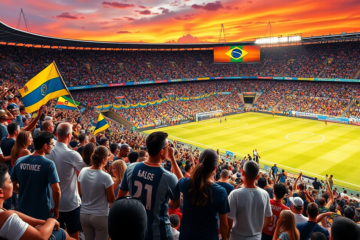League Rejects Flamengo's Lawsuit Against Globo
Legal Action brought by Flamengo against the Brazilian Football League generated an intense debate about the relations between the clubs and the distribution of broadcast quotas for the Brazilian Championship.
In this article, we will explore the main points of the League's criticism of Flamengo, highlighting the implications of such a measure for harmony between the clubs and the positions of both parties, in addition to analyzing the current contract with Globo and its specificities.
The situation reflects the internal tensions in Brazilian football and the struggle for interests that go beyond the collective.
Overview of the Flamengo vs. Liga vs. Globo Controversy
O conflict involving Flamengo and the Brazilian Football League around the R$ 77.1 million of the Brazilian Championship broadcast quotas resulted in a legal dispute that shook the relationship between the clubs.
Flamengo decided to go to court to demand that Globo deposit the aforementioned amount, arguing losses in contracts totaling billions.
This action provoked a immediate reaction of the League, which considered the measure as a attack on harmony between teams and an attempt to prioritize individual interests.
Several clubs have publicly expressed their
repudiation
to Flamengo's stance, highlighting the importance of complying with collective agreements for sustainability in the long term of Brazilian football.
Furthermore, Flamengo's decision to block the transfer of quotas generated a wave of dissatisfaction among the League's member clubs, resulting in serious impacts for the progress of the championship, as reported by this sourceAs the dispute progresses, the continuation of the broadcasting contract, which runs until 2029, remains under scrutiny, putting essential resources at stake for the clubs involved.
Position of the Brazilian Football League
The Brazilian Football League has officially commented on the lawsuit filed by Flamengo, defending the importance of collective decisions between clubs.
In its statement, the League criticized Flamengo's management for prioritizing short-term interests and not respecting established contractual commitments.
The entity reinforced the need for strict compliance with contracts and maintaining harmony between teams.
League's Repudiation of Flamengo's Legal Action
A harmony between clubs suffered a significant blow with the lawsuit filed by Flamengo, which, by blocking R$ 77 million of the broadcast transfers, prioritized short-term interests to the detriment of collective commitments.
This move drew severe criticism from Brazilian Football League, which highlighted the deterioration in the coexistence between sports entities.
According to a statement available at Globo: Flamengo's court decision, discontent is evident among the clubs that make up the Ligra.
Flamengo's unilateral attitude, as stated by ESPN: Understand the behind the scenes, ignores collectively ratified decisions.
“The movement erodes the spirit of unity and collaboration, harming the championship as a whole.
“
This situation challenges the integrity and sustainability of Brazilian football, highlighting increasingly deep intrigues and divisions within the national sports structure.
Defense of Collective Decisions and Respect for Contracts
To the collective decisions are the backbone for the harmony and balance between the clubs of the Brazilian Football League.
By emphasizing the importance of joint decisions, the League defends the fulfillment of contracts, contradicting Flamengo's individualistic stance.
This club, with its current management, seeks contractual replacements in favor of immediate interests, subverting previously agreed decisions.
| Principle | Argument |
|---|---|
| Collectivity | Pay-per-view |
| Contract Compliance | Claims of Injury |
Criticism of Flamengo's Management
Flamengo's management faces severe criticism from the Brazilian Football League due to its decision to file a lawsuit against Globo, requesting the deposit of R$77.1 million relating to the second installment of the Brazilian Championship broadcast quotas.
This move, as pointed out by the League, harms harmony between the clubs and prioritizes Flamengo's short-term interests.
However, the club argues that broadcasting funds need to be distributed based on the number of subscribers. pay-per-view, which they consider fairer.
The reaction of the sports community reflects disagreement regarding Flamengo's attitude.
- Legal action harms harmony between clubs.
- Priority to short-term interests.
- Subscriber-based distribution criteria advocated by Flamengo.
Broadcast Contract with Globo until 2029
The transmission contract Brazilian Championship games with Globo is a long-term agreement that extends until 2029, ensuring exclusive rights to broadcast matches of clubs in the Brazilian Football League.
This contract, according to available information, involves a significant amount, around R$1.4 billion, as mentioned in Globo contract details.
Recipes are distributed with clear rules and previously agreed, following criteria that include the equal division of 40\% of the amount between the clubs and a variable part based on sporting performance and popularity measured in pay-per-view accesses.
The validity of this partnership provides financial stability for clubs, but also requires ongoing negotiation to ensure that the expectations of all parties involved are met.
- Deadline: until 2029
- Approximate values: R$ 6 billion
- Criteria: equal division, performance, popularity
In summary, the dispute between the Brazilian Football League and Flamengo highlights crucial questions about collective decisions and the importance of fulfilling commitments.
The continuation of the contract with Globo until 2029 could shape the future of revenue distribution and the relationship between the clubs.



0 Comments